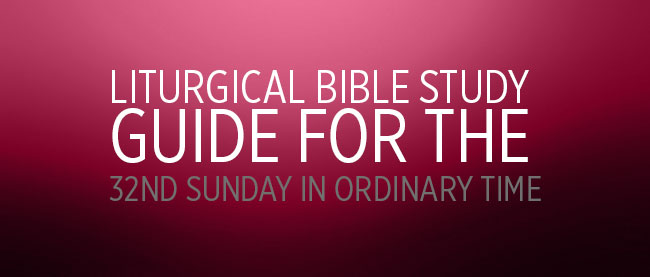1st Reading – 2 Maccabees 7:1-2, 9-14
The title of 1 and 2 Maccabees is taken from the surname of Judas Maccabeus (1 Maccabees 2:4), the hero of the war of Jewish independence against Syria. The two books have separate authors. The first book is thought to have originally been written in Hebrew, although only a Greek translation survives, by a Palestinian Jew around 100 B.C. The second book is believed to have been composed in Greek by an Alexandrian Pharisee about 124 B.C. So, in fact, the second book was written before the first.
Both books encompass a similar period in Jewish history, the first book covering 175 to 135 B.C., and the second covering 175 to 161 B.C.
After the death of Alexander the Great in 323 B.C., Egypt and Syria contended over the possession of Palestine. The kings of Egypt, known as the Ptolemies, retained the overlordship over the Jews for more than 100 years. They treated the Jews mildly and permitted them to live undisturbed according to the laws of Moses. Still, Greek habits and ideas were widely adopted in Palestine, Greek culture (Hellenism) casting its spell especially over the higher classes. In 198 B.C., Antiochus II, Seleucid king of Syria, conquered Palestine and incorporated it with his own kingdom. The conqueror himself did not interfere with the religious life of the Jews, but his son and successor, Antiochus IV (Epiphanes), who ruled from 175 to 164 B.C. tried to force paganism upon all his subjects. In 170 he plundered the Temple and slew many of the inhabitants of Jerusalem. Two years later he threw a garrison into the citadel and ordered all Jews under pain of death to adopt pagan rites and customs. A statue of Zeus was placed above the altar of burnt offerings, and an edict was issued ordaining the erection of heathen altars in every town of Palestine. Many apostatized; but many also preferred to suffer torture and death rather than transgress the law of God.
The second book of Maccabees is important from a doctrinal point of view: it aims at bringing out strongly the religious lessons of the time, the book being written more as a sermon than a history. It includes such fundamental texts as that which states that God created all things out of nothing and those which make it clear that the sacrifice of martyrs is a voluntary form of atonement which placates God’s anger. Other texts lay stress on the intercession of the saints, and the value of prayers for the dead.
To better understand our 1st reading we will read all of 2 Maccabees, Chapter 7.
2nd Reading – 2 Thessalonians 2:16-3:5
Last week we began our study of 2 Thessalonians. Recall that this letter was written to clear up some misunderstandings caused by the first letter. The misunderstandings concerned the second coming and when it would occur. Some had even given up working in anticipation of the event. Paul wrote to assure them that no one knew when it would occur and that they were to keep on working until the end. Today we hear Paul’s prayer for strengthening.
Gospel – Luke 20:27-38
Jesus is now in Jerusalem for His passion. He has made His triumphal entry which we celebrate on Passion (Palm) Sunday, he has upset the establishment by cleansing the temple. The Pharisees, scribes, and Sadducees are all now interested in getting rid of Him.
Bible Study guide from Fr. Cielo Almazan


